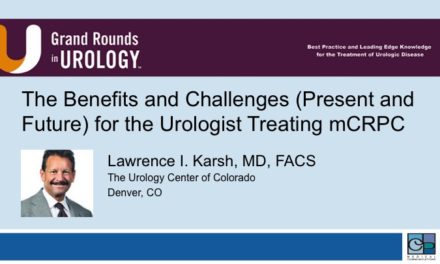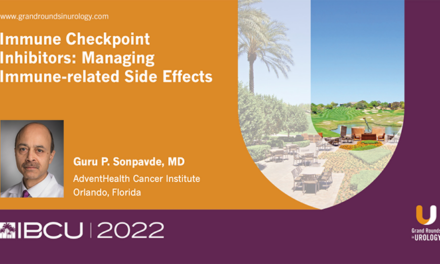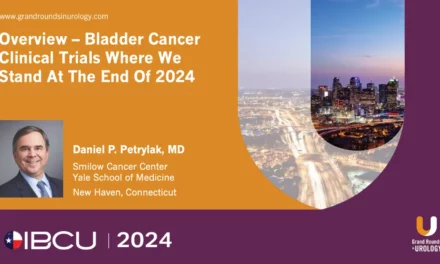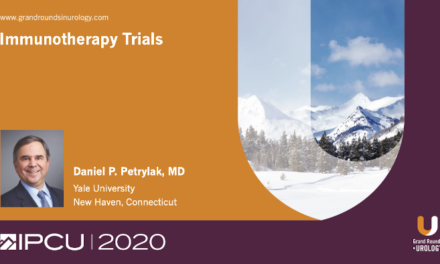Daniel P. Petrylak, MD, presented “mCRPC – Inroads in Improved Outcomes” during the 33rd International Prostate Cancer Update on January 23, 2023, in Vail, Colorado.
How to cite: Petrylak, Daniel P. “mCRPC – Inroads in Improved Outcomes.” January 23, 2023. Accessed May 2025. https://grandroundsinurology.com/mcrpc-inroads-in-improved-outcomes/
mCRPC – Inroads in Improved Outcomes – Summary
Daniel P. Petrylak, MD, Director of Genitourinary Oncology, Professor of Medicine and Urology, Co-Leader of Cancer Signaling Networks, and Co-Director of the Signal Transduction Program at Yale University Cancer Center in New Haven, Connecticut discusses inroads into improved outcomes in the treatment of metastatic castration-resistant prostate cancer (mCRPC). He reviews ways patients become castrate-resistant and summarizes treatment agents, including immunotherapeutic treatments, hormone treatments, cytotoxic treatments, agents that damage DNA (e.g., radium-223), and biologic markers. Dr. Petrylak explains the importance of patient clinical characteristics in treatment sequencing before addressing the importance of determining microsatellite instability (MSI) in patients with mCRPC. A study explains that pembrolizumab is indicated for high MSI patients, demonstrating a 50 percent response rate that can be very durable. Dr. Petrylak then addresses abiraterone and enzalutamide, pointing out there is clinical evidence of cross-resistance between these, and that taxanes are probably less effective after treatment with these. He outlines the mechanisms of resistance to abiraterone and enzalutamide, highlighting progesterone-activated androgen-receptor (AR) mutations (T878A). Dr. Petrylak delves deeper, describing a study examining bavdegalutamide (ARV-110), a novel, oral, proteolysis-targeting chimera (PROTAC) protein degrader that targets wild-type AR and clinically relevant mutants. He cites another study of ARV-110 that shows it affects the T878X/H875Y variant of the AR, causing more activity in the AR; the PSA50 response rate was 46 percent in patients with tumors harboring T878X/H875Y mutations. Furthermore, a conclusion can be drawn from the TROPIC trial that resulted in the approval of cabazitaxel, and the CARD trial, which showed that improved progression-free survival and overall survival (OS) for patients on cabazitaxel compared with the alternate antiandrogen, that practitioners are better off moving patients to chemotherapy rather than switching antiandrogens. Dr. Petrylak explains that in the TOPARP study, patients with mCRPC who were docetaxel pretreated were given olaparib, and while the overall response rate was ~33 percent, of 16 patients with DNA repair mutations, 14 responded to olaparib treatment. He addresses the phase-three PROfound study of olaparib that showed a three-month increase in OS compared to the current best standard of care. Dr. Petrylak issues a reminder of PARP-inhibitor toxicities due to the preclinical data suggesting synergy when a PARP inhibitor is combined with agents that inhibit androgen synthesis or function (like second-generation antiandrogens). He discusses the MAGNITUDE, PROpel, and VISION trials in depth and explains that the U.S. Food and Drug Administration (FDA) has approved 177Lu-PSMA-617 for mCRPC patients who have been treated with AR pathway inhibition and taxane-based chemotherapy. Dr. Petrylak concludes that all patients must be molecularly profiled (tested for MSI, mutational burden, and DNA damage response [DDR] mutations), emphasizes that checkpoint inhibition therapy is an appropriate treatment for those with MSI, and that PARP inhibition is appropriate for patients with DNA repair mutations.
About The 33rd Annual International Prostate Cancer Update:
The International Prostate Cancer Update (IPCU), founded in 1990, is a multi-day CME conference focused on prostate cancer treatment updates with expert, international faculty. It is led by expert physicians and is designed for urologists, medical oncologists, radiation oncologists, and other healthcare professionals involved in the diagnosis and treatment of prostate cancer. The 33rd iteration of the meeting occurred January 22-25, 2023 in Vail, Colorado. To view more educational presentations from IPCU 33, visit our collection page.
ABOUT THE AUTHOR
Daniel P. Petrylak, MD, leads the genitourinary cancers medical oncology team at Smilow Cancer Hospital as director of the genitourinary cancer research group, professor, and co-director of the Cancer Signaling Network program. Dr. Petrylak joined Yale from Herbert Irving Cancer Center at Columbia University Medical Center with New York-Presbyterian Hospital, where he served as Professor of Medicine (Medical Oncology) and Urology and began his appointment in September of 2012. After serving for more than 20 years as the advanced bladder chair for SWOG, Dr. Petrylak is now the Vice Chair of the Genitourinary Committee.





